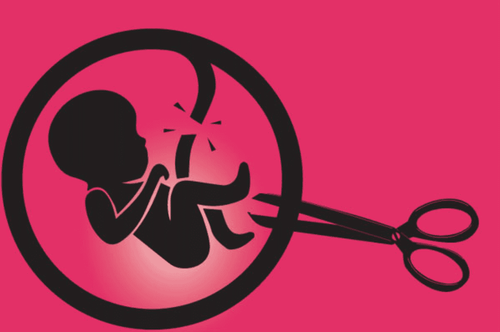This article was professionally reviewed by MSc. Dr. Ly Thi Thanh Nha - Obstetrics and Gynecology Department, Vinmec Da Nang International Hospital.
The retention of placental tissue after medical abortion can result in prolonged bleeding, leading to infection and anemia. Prompt treatment is necessary to prevent severe complications such as pelvic infection and sepsis.
1. Symptoms of retained placental tissue after medical abortion
Women who undergo termination of pregnancy must attend follow-up examinations to ensure that the uterine lumen is completely cleared of placental tissue, thereby avoiding retained placental tissue after a medical abortion.
Typically, the presence of retained placental tissue or fetal remnants can be identified through clinical examinations, combined with ultrasound and symptoms such as severe abdominal pain and heavy bleeding.
In some cases, although the pregnancy tissue and placenta have been completely removed, blood and fluids may still remain in the uterine lumen. On ultrasound, there are mixed-echo masses in the uterus. In such situations, doctors can indicate patients with medical treatment and monitoring after that. If the retained fluids persist or increase after treatment, surgical intervention may be necessary.
The uterine lumen is normally sterile. However, after abortion procedures, even with careful and skilled curettage, internal bleeding can create favorable conditions for bacterial infection, leading to endometritis. The older the gestational age and the higher the level of reproductive tract infection, the greater the risk of post-abortion complications.
Signs indicating potential infection include prolonged bleeding, foul-smelling discharge, increasing abdominal pain, bacterial infection signs: fever, bad breath, and fatigue. If these symptoms occur, prompt treatment is necessary to avoid serious complications such as pelvic infection and sepsis.

2. Support before, during, and after abortion
Before undergoing an abortion, women must be thoroughly informed and guided through the necessary procedures. Most cases require careful counseling and discussion before deciding to terminate the pregnancy. Additionally, the process, duration, and associated risks of the abortion procedure must be clearly explained.
Nurses should provide emotional support to patients before, during, and after the abortion to prevent depression. In some cases, intervention from psychological professionals may be required. Women should avoid alcohol, caffeine, tobacco, or other stimulants to deal with depression.
During and after the procedure, women often face loneliness, anxiety, and fear, particularly when no family members accompany them. Post-abortion, severe depression may occur. Besides psychological issues, abortions carry risks of serious complications, including uterine perforation, hemorrhage, cervical or vaginal trauma, and side effects from anesthesia or sedatives used during the procedure.
After an abortion, women should be guided on proper care to prevent complications such as retained placental tissue, avoid intercourse and maintain genital hygiene. Women should not use cotton swabs and do not perform vaginal douching since these actions can lead to hemorrhage or infection.
Late complications may include retained placental tissue, infection, fever, foul-smelling discharge, inflammation-induced intrauterine adhesions. These complications have severe effects on future fertility of patients.
3. Post-Abortion Care

Women who decide to undergo an abortion often face immense emotional stress. Providing encouragement, comfort, explanations, and active listening are essential to helping them cope.
Regarding sexual activity, women should avoid intercourse for the first month post-abortion and avoid inserting any devices into the vagina. Healthcare providers should carefully guide women on contraception post-abortion and assess their understanding after guidance. Additionally, women should receive advice on post-sexual hygiene and potential risks associated with abortion.
To accurately determine the extent of fluid retention or retained placental tissue when abnormal signs are observed, patients should seek early medical examination. If retained tissue or fluid in the uterus is diagnosed, active treatment as prescribed by a doctor is necessary. Delaying treatment increases the risk of uterine infection. If the infection ascends to the fallopian tubes or ovaries, future fertility may be compromised.
About Dr. Ly Thi Thanh Nha
MSc. Dr. Ly Thi Thanh Nha has worked at Hue University of Medicine and Pharmacy Hospital and Quang Tri General Hospital before joining Vinmec Da Nang International Hospital.
Dr. Nha specializes in monitoring and treating pregnancy complications, prenatal screening, cesarean delivery, laparoscopic surgery for ovarian cysts, and ectopic pregnancies. She has extensive experience and expertise in obstetric and gynecological care.
To arrange an appointment, please call the HOTLINE or make your reservation directly HERE. You may also download the MyVinmec app to schedule appointments faster and manage your reservations more conveniently.














